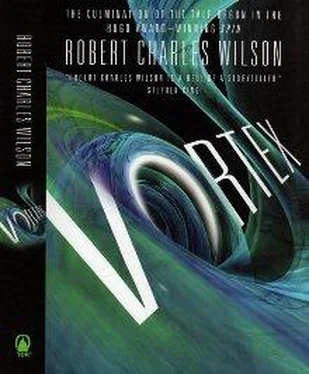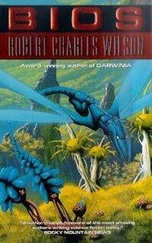“So maybe we can assume Orrin talked to the boy, or overheard something and drew his own conclusions, and he incorporated that into his story.”
“Logically, yeah. He’s not psychic.”
“Well, he predicted the storm,” Sandra said. The rain eased off every once in a while but it always came roaring back, as if half the Gulf of Mexico had levitated over the city and yielded to gravity.
“But he was wrong about other details. Orrin’s document says the warehouse was empty except for the night watchman. It’s not, not tonight. Also, one of the reasons Orrin was so upset when he was fired is that he thought he was supposed to be the watchman on duty when Turk set fire to the place.”
“He was predicting his own death?”
“In a sense. But not because he wants to die. Orrin doesn’t strike me as remotely suicidal. I think he came here to prevent the thing he was predicting, whether he’s the victim of it or not.”
Bose sketched out the scenario for her. Orrin, working at the Findley warehouse, somehow uncovers a plan on the part of the boss’s son to commit an act of arson, and he incorporates that knowledge into his ongoing notebook fantasies. The notebooks are the work of a troubled young man who happens to be smarter than anyone including his sister imagines he is, but whose grip on reality is tentative at best. Unexpectedly fired from his job, and then locked up at State, Orrin panics: he believes the time of the planned arson is close and he thinks he can stop it if he can get free. (Which was why he bit Jack Geddes during his clumsy attempt to break out, Sandra thought.) Once Bose and Sandra cut him loose, he borrows car fare from Ariel and sets out to prevent Turk Findley from committing an unforgiveable act.
Sandra thought about it. “Seems like your timeline is a little off. Orrin was fired before he could have known anything about Turk’s romantic problems.”
“We don’t know who his source is. Maybe it was secondhand. Maybe he stayed in touch with someone at the warehouse. The pertinent passages in the document are the most recent ones, and we don’t know for sure when they were written.”
“Why would he even care whether Turk Findley sets fire to his father’s business? Orrin already lost his job there—work that paid less than minimum wage and barely covered the rent on a flophouse room.”
“I don’t know,” Bose admitted. “A few days ago I was hoping you could tell me.”
She didn’t have an answer for him, then or now. “What if the explanation is even stranger than that? I don’t know. Something just… weird.”
“Then we’re still sitting here,” Bose said. “Doing what we’re doing.”
* * *
The woman behind the restaurant counter, the one who had invited Bose to make himself comfortable, left for the day. Sandra caught a glimpse of her as she drove off in a ten-year-old blue Honda. She was replaced by a teenage boy with facial eczema and a nervous tic. The night manager poked his head out of his office a couple of times, eyeing them, until Bose got up and said something reassuring. He bought a couple of doughnuts, which neither of them touched.
The next bus arrived on schedule. The rain was still gushing down, overflowing the gutters and rinsing the street of its sheen of oil. Four people got off this time. They all looked like shift workers to Sandra. None of them was Orrin Mather. Three of them ran to the left, hurrying toward shelter. One turned right and began walking at a casual pace, as if the rain didn’t concern him.
She turned away from the window but found Bose still staring intently through the glass. “What is it?”
“The young guy. The one by himself.”
Young, yes. A skinny young guy wearing a black poncho and carrying something bulky in a plastic bag.
“Shit,” Bose said.
She leapt to the same absurd but unavoidable conclusion: “You think it’s Findley’s son? You think that’s Turk Findley?” The boy reached the corner and then turned south, toward the warehouse. “What do we do?”
Bose stood up abruptly. “Stay here. Keep your phone handy. Call me if you see Orrin. Or anything else I need to know about. Otherwise sit tight until you hear from me.”
“Bose!” she said.
“Love you,” he said, maddeningly and for the first time.
He was out the door before she could close her mouth. She watched through the window as he cut through the restaurant parking lot, keeping to a fence line parallel to the street and ignoring the rain that instantly soaked him.
The counter clerk must have noticed her startled expression. “Ma’am?” he asked helpfully. “You want a coffee or something?”
“Crazy,” she said aloud.
“Ma’am?”
“Not you.”
Chapter Twenty-six
Allison’s Story
I waited for Turk among the aircraft on the docking level high above the city.
I had taken a twisty route to get here, up the quiet starboard terraces and along the shaded parkland corridors Treya had loved as a child. Every garden and gateway along the way was freighted with memory ( her memory). It was hard not to grieve. Vox was dying and there was nothing I could do about it—nothing I could do for lost friends or the family that had ostracized me or the city I had once loved. Nothing except carry my memories and misgivings to a safer place, worlds away.
The aircraft bay was an open terrace, protected from the toxic atmosphere by an electrostatic roof. Voxish aircraft were aligned across this vast flat acreage as if they had been planted there, silvery crops in a mechanical garden. The maintenance and flight crews had all gone home to be with their families. My footsteps sounded like water dripping in a vacant room.
I found an inconspicuous place at the base of a light tower and sat down and waited. An uncomfortable amount of time passed. I began to think Turk might not show up. That he might have been prevented from showing up. That he might have chosen not to show up. The node had finally infiltrated the parts of his brain that governed love, loyalty, needs, and desires, and with every passing moment the neural webwork grew more subtle and efficient. The Coryphaeus was singing a soft, sweet refrain in the echo chamber of his medial prefrontal cortex.
What if he didn’t come? But it was an easy question to answer: I would die here. In all likelihood the Hypothetical machines would dismantle and consume Vox Core the way they had dismantled and consumed the vanguard expedition out on the Antarctic plain, and that would be the end of it. I felt an uncontrollable upwelling of fear. Not the predictable fear of dying but the special and very Voxish fear of dying alone …
Then I heard a door slide open in one of the transport pods some distance away. I hid myself and waited until I was sure it was Turk. He walked out of the vertical transport stiffly, maybe reluctantly. His expression was hollow and haggard. I called his name and ran to him.
* * *
Because Vox was a peaceful and crime-free community it had little use for internal security beyond the routine vigilance of the Network. But for much of its history Vox had been at war with external powers, chiefly the bionormative communities of the Middle and Elder Worlds. Our aircraft were weapons of war, and they were secured as weapons of war.
I chose us a large but lightly armed craft of the kind used to transport weapons or troops. The entry hatch was a Network-enabled interface like the ones Turk had lately taught himself to use. When I was Treya I could have opened it effortlessly just by putting my hand against the control surface and working the options in my head. But I had lost that ability when I lost my node. As Allison, I was locked out of all but the simplest Voxish appliances and applications. The problem was that Turk was a novice, and he was obviously having a hard time focusing his intentions. He may, at this point, have been uncertain about what he really wanted. A long breathless moment passed; then the hatch slid open.
Читать дальше












